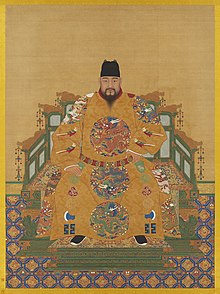
Back جنقتونق AZB Zhengtong Catalan Mìng Ĭng-cŭng CDO Jing-cung Czech Zhengtong German Zhu Qizhen Spanish جنگتونگ Persian Zhengtong Finnish Ming Yingzong French יינג-דזונג, קיסר סין HE
| Emperor Yingzong of Ming 明英宗 | |||||||||||||||||
|---|---|---|---|---|---|---|---|---|---|---|---|---|---|---|---|---|---|
 | |||||||||||||||||
| Emperor of the Ming dynasty | |||||||||||||||||
| First reign | 7 February 1435 – 22 September 1449 | ||||||||||||||||
| Enthronement | 7 February 1435 | ||||||||||||||||
| Predecessor | Xuande Emperor | ||||||||||||||||
| Successor | Jingtai Emperor | ||||||||||||||||
| Regents | See list
| ||||||||||||||||
| Second reign | 11 February 1457 – 23 February 1464 | ||||||||||||||||
| Predecessor | Jingtai Emperor | ||||||||||||||||
| Successor | Chenghua Emperor | ||||||||||||||||
| Emperor Emeritus of the Ming dynasty | |||||||||||||||||
| Tenure | 22 September 1449 – 11 February 1457 | ||||||||||||||||
| Crown Prince of the Ming dynasty | |||||||||||||||||
| Tenure | 1428–1435 | ||||||||||||||||
| Predecessor | Crown Prince Zhu Zhanji | ||||||||||||||||
| Successor | Crown Prince Zhu Jianshen | ||||||||||||||||
| Born | 29 November 1427 Xuande 2, 11th day of the 11th month (宣德二年十一月十一日) | ||||||||||||||||
| Died | 23 February 1464 (aged 36) Tianshun 8, 17th day of the 1st month (天順八年正月十七日) | ||||||||||||||||
| Burial | Yuling Mausoleum, Ming tombs, Beijing | ||||||||||||||||
| Consorts | |||||||||||||||||
| Issue Detail | |||||||||||||||||
| |||||||||||||||||
| House | Zhu | ||||||||||||||||
| Dynasty | Ming | ||||||||||||||||
| Father | Xuande Emperor | ||||||||||||||||
| Mother | Empress Xiaogongzhang | ||||||||||||||||
Emperor Yingzong of Ming (Chinese: 明英宗; pinyin: Míng Yīngzōng; 29 November 1427 – 23 February 1464), personal name Zhu Qizhen (simplified Chinese: 朱祁镇; traditional Chinese: 朱祁鎮; pinyin: Zhū Qízhèn), was the sixth and eighth emperor of the Ming dynasty. He ruled as the Zhengtong Emperor (simplified Chinese: 正统帝; traditional Chinese: 正統帝; pinyin: Zhèngtǒng Dì) from 1435 to 1449, and as the Tianshun Emperor (simplified Chinese: 天顺帝; traditional Chinese: 天順帝; pinyin: Tiānshùn Dì) from 1457 until his death in 1464.
He was the eldest son and successor of the Xuande Emperor. "Zhengtong", the era name of his first reign, means "right governance". During his first reign, the empire was at its height of prosperity and power. As the first child emperor of the Ming dynasty, Emperor Yingzong's rule was heavily influenced by high dignitaries at court. Initially, his grandmother, Grand Empress Dowager Zhang, along with the "Three Yangs" (Yang Shiqi, Yang Rong, and Yang Pu), held the highest positions of power. However, in 1442, the emperor began to listen more to the eunuch Wang Zhen.
In 1449, at Wang Zhen's suggestion, Yingzong personally led the army against the Mongol army of Esen Taishi. Unfortunately, at the Battle of Tumu Fortress, the Ming army was defeated and the emperor was captured. This event shocked the government and the country, leading the court to elevate Yingzong's brother, Zhu Qiyu, to the throne as the Jingtai Emperor. During his captivity, Yingzong had established good relations with Esen and was eventually released in 1450.
After Emperor Yingzong returned to his homeland, his brother felt threatened and ordered him to stay in the Southern Palace within the Forbidden City. He also restricted Yingzong's contact with the outside world. Essentially, Yingzong was placed under house arrest. In early 1457, the Jingtai Emperor fell ill and, since his only son had died in 1453, there was no heir to the throne. Taking advantage of this opportunity, Yingzong organized a palace coup and regained power in February 1457. The era name of his second reign, "Tianshun", means "obedience to Heaven". The following month, the Jingtai Emperor died.
Yingzong ruled for another seven years before his death in 1464 at the age of thirty-six. His eldest son, the Chenghua Emperor, then ascended to the imperial throne.
© MMXXIII Rich X Search. We shall prevail. All rights reserved. Rich X Search